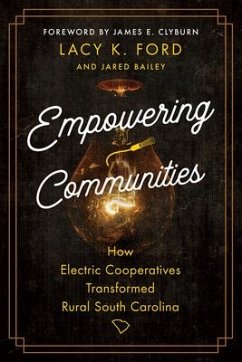"... the critical role of the Palmetto State's electric cooperatives in bringing electricity to the rural population of the state and their ongoing efforts over decades to enhance the quality of life in the state's rural areas. From the moment the lights came on, South Carolina's electric cooperatives ushered rural South Carolina communities into the modern world by making labor-saving electric appliances and modern conveniences available to rural people, serving as a center of community experience, and, at the present moment, leading the effort to bring high-speed internet access to currently underserved rural citizens. The rise of electricity transmitted, delivered, and serviced by member-owned cooperatives and sanctioned by federal and state legislation is a fascinating and complicated saga, one that takes readers into politics, law, finance, business, territorial competition, the technology of electrical generation and transmission, and rural economic development. Ford touches on all of these issues in this short volume, but the focus will remain on the dramatic and continuing changes driven by the electricity and sense of community the cooperatives brought to farms and villages and towns across the state. Ford and Bailey explore how, across decades, the cooperatives helped bring dramatic, fundamental, and transformational change to the lives of rural people in South Carolina. To be sure, it was an era of dramatic change across much of South Carolina as ownership of automobiles and other modern improvements lessened the isolation of the countryside, but without question rural electrification changed the daily routines and life experiences of rural people-Black and White, men and women-repeatedly across the decades after the 'lights came on' in rural South Carolina. A final chapter will address the ongoing controversy of Santee Cooper, the state-owned electric utility which generates and sells over three-quarters of its electricity to one customer: South Carolina's electric cooperatives. James E. Clyburn, majority whip and the third-ranking Democrat in the United States House of Representatives, and a long-time supporter of electric cooperatives in South Carolina, provides a foreword"--








